BUS267 Work Based Learning: Reflective Log on Business Concepts 2018
VerifiedAdded on 2023/06/11
|5
|1423
|288
Journal and Reflective Writing
AI Summary
This journal reflects on key business concepts covered in the BUS267 Work Based Learning unit, including corporate social responsibility (CSR), change management, professional ethics and values, and corporate governance. The reflections detail learnings from lectures, such as the importance of CSR for sustainable progress, different levels and factors influencing change management, the role of ethics and values in business, and the purpose of corporate governance in ensuring effective management. The author emphasizes the practical relevance of these concepts for their future career, highlighting the ability to adapt to change, maintain ethical standards, and contribute to effective corporate governance. The document provides an overview of the topics discussed in the lectures and their significance.
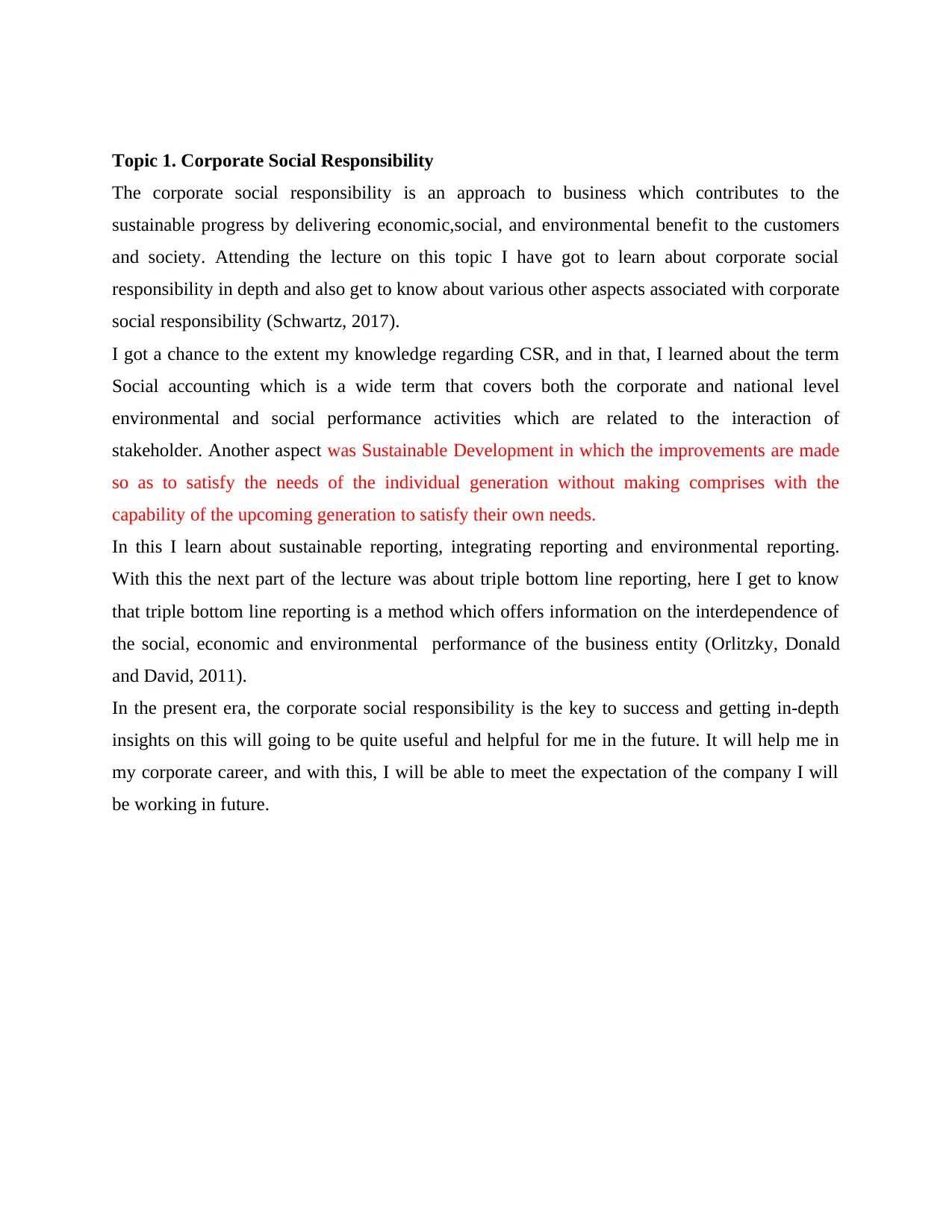
Topic 1. Corporate Social Responsibility
The corporate social responsibility is an approach to business which contributes to the
sustainable progress by delivering economic,social, and environmental benefit to the customers
and society. Attending the lecture on this topic I have got to learn about corporate social
responsibility in depth and also get to know about various other aspects associated with corporate
social responsibility (Schwartz, 2017).
I got a chance to the extent my knowledge regarding CSR, and in that, I learned about the term
Social accounting which is a wide term that covers both the corporate and national level
environmental and social performance activities which are related to the interaction of
stakeholder. Another aspect was Sustainable Development in which the improvements are made
so as to satisfy the needs of the individual generation without making comprises with the
capability of the upcoming generation to satisfy their own needs.
In this I learn about sustainable reporting, integrating reporting and environmental reporting.
With this the next part of the lecture was about triple bottom line reporting, here I get to know
that triple bottom line reporting is a method which offers information on the interdependence of
the social, economic and environmental performance of the business entity (Orlitzky, Donald
and David, 2011).
In the present era, the corporate social responsibility is the key to success and getting in-depth
insights on this will going to be quite useful and helpful for me in the future. It will help me in
my corporate career, and with this, I will be able to meet the expectation of the company I will
be working in future.
The corporate social responsibility is an approach to business which contributes to the
sustainable progress by delivering economic,social, and environmental benefit to the customers
and society. Attending the lecture on this topic I have got to learn about corporate social
responsibility in depth and also get to know about various other aspects associated with corporate
social responsibility (Schwartz, 2017).
I got a chance to the extent my knowledge regarding CSR, and in that, I learned about the term
Social accounting which is a wide term that covers both the corporate and national level
environmental and social performance activities which are related to the interaction of
stakeholder. Another aspect was Sustainable Development in which the improvements are made
so as to satisfy the needs of the individual generation without making comprises with the
capability of the upcoming generation to satisfy their own needs.
In this I learn about sustainable reporting, integrating reporting and environmental reporting.
With this the next part of the lecture was about triple bottom line reporting, here I get to know
that triple bottom line reporting is a method which offers information on the interdependence of
the social, economic and environmental performance of the business entity (Orlitzky, Donald
and David, 2011).
In the present era, the corporate social responsibility is the key to success and getting in-depth
insights on this will going to be quite useful and helpful for me in the future. It will help me in
my corporate career, and with this, I will be able to meet the expectation of the company I will
be working in future.
Paraphrase This Document
Need a fresh take? Get an instant paraphrase of this document with our AI Paraphraser
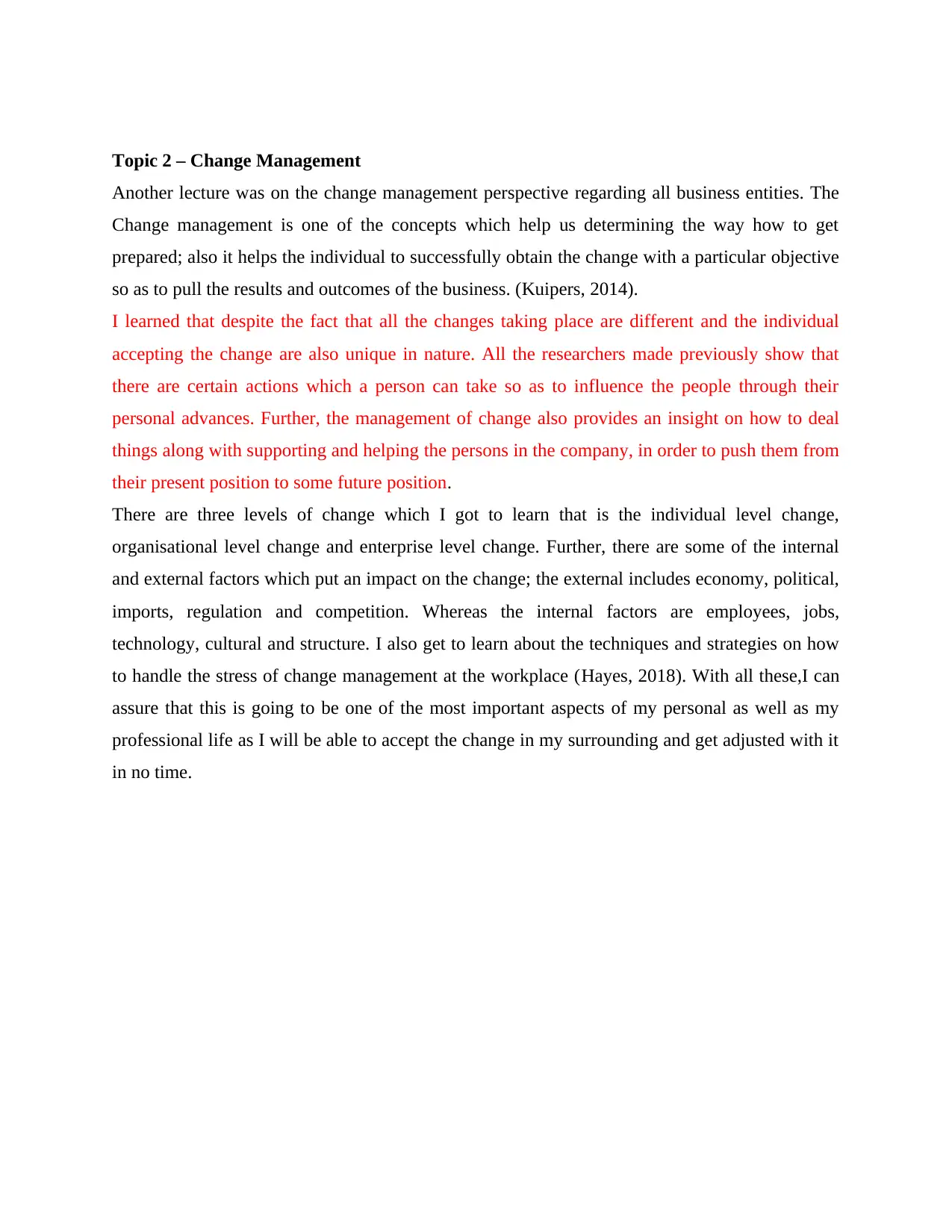
Topic 2 – Change Management
Another lecture was on the change management perspective regarding all business entities. The
Change management is one of the concepts which help us determining the way how to get
prepared; also it helps the individual to successfully obtain the change with a particular objective
so as to pull the results and outcomes of the business. (Kuipers, 2014).
I learned that despite the fact that all the changes taking place are different and the individual
accepting the change are also unique in nature. All the researchers made previously show that
there are certain actions which a person can take so as to influence the people through their
personal advances. Further, the management of change also provides an insight on how to deal
things along with supporting and helping the persons in the company, in order to push them from
their present position to some future position.
There are three levels of change which I got to learn that is the individual level change,
organisational level change and enterprise level change. Further, there are some of the internal
and external factors which put an impact on the change; the external includes economy, political,
imports, regulation and competition. Whereas the internal factors are employees, jobs,
technology, cultural and structure. I also get to learn about the techniques and strategies on how
to handle the stress of change management at the workplace (Hayes, 2018). With all these,I can
assure that this is going to be one of the most important aspects of my personal as well as my
professional life as I will be able to accept the change in my surrounding and get adjusted with it
in no time.
Another lecture was on the change management perspective regarding all business entities. The
Change management is one of the concepts which help us determining the way how to get
prepared; also it helps the individual to successfully obtain the change with a particular objective
so as to pull the results and outcomes of the business. (Kuipers, 2014).
I learned that despite the fact that all the changes taking place are different and the individual
accepting the change are also unique in nature. All the researchers made previously show that
there are certain actions which a person can take so as to influence the people through their
personal advances. Further, the management of change also provides an insight on how to deal
things along with supporting and helping the persons in the company, in order to push them from
their present position to some future position.
There are three levels of change which I got to learn that is the individual level change,
organisational level change and enterprise level change. Further, there are some of the internal
and external factors which put an impact on the change; the external includes economy, political,
imports, regulation and competition. Whereas the internal factors are employees, jobs,
technology, cultural and structure. I also get to learn about the techniques and strategies on how
to handle the stress of change management at the workplace (Hayes, 2018). With all these,I can
assure that this is going to be one of the most important aspects of my personal as well as my
professional life as I will be able to accept the change in my surrounding and get adjusted with it
in no time.
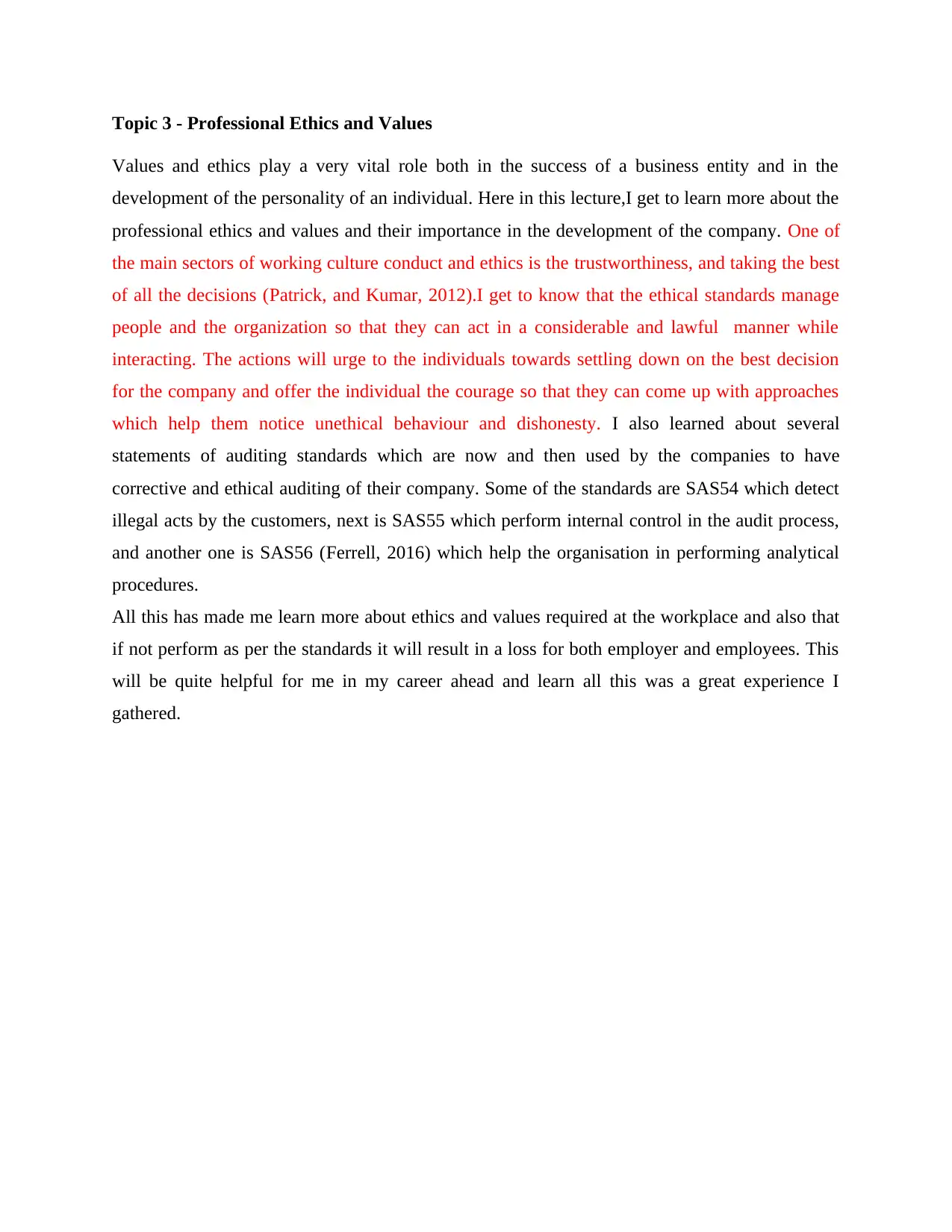
Topic 3 - Professional Ethics and Values
Values and ethics play a very vital role both in the success of a business entity and in the
development of the personality of an individual. Here in this lecture,I get to learn more about the
professional ethics and values and their importance in the development of the company. One of
the main sectors of working culture conduct and ethics is the trustworthiness, and taking the best
of all the decisions (Patrick, and Kumar, 2012).I get to know that the ethical standards manage
people and the organization so that they can act in a considerable and lawful manner while
interacting. The actions will urge to the individuals towards settling down on the best decision
for the company and offer the individual the courage so that they can come up with approaches
which help them notice unethical behaviour and dishonesty. I also learned about several
statements of auditing standards which are now and then used by the companies to have
corrective and ethical auditing of their company. Some of the standards are SAS54 which detect
illegal acts by the customers, next is SAS55 which perform internal control in the audit process,
and another one is SAS56 (Ferrell, 2016) which help the organisation in performing analytical
procedures.
All this has made me learn more about ethics and values required at the workplace and also that
if not perform as per the standards it will result in a loss for both employer and employees. This
will be quite helpful for me in my career ahead and learn all this was a great experience I
gathered.
Values and ethics play a very vital role both in the success of a business entity and in the
development of the personality of an individual. Here in this lecture,I get to learn more about the
professional ethics and values and their importance in the development of the company. One of
the main sectors of working culture conduct and ethics is the trustworthiness, and taking the best
of all the decisions (Patrick, and Kumar, 2012).I get to know that the ethical standards manage
people and the organization so that they can act in a considerable and lawful manner while
interacting. The actions will urge to the individuals towards settling down on the best decision
for the company and offer the individual the courage so that they can come up with approaches
which help them notice unethical behaviour and dishonesty. I also learned about several
statements of auditing standards which are now and then used by the companies to have
corrective and ethical auditing of their company. Some of the standards are SAS54 which detect
illegal acts by the customers, next is SAS55 which perform internal control in the audit process,
and another one is SAS56 (Ferrell, 2016) which help the organisation in performing analytical
procedures.
All this has made me learn more about ethics and values required at the workplace and also that
if not perform as per the standards it will result in a loss for both employer and employees. This
will be quite helpful for me in my career ahead and learn all this was a great experience I
gathered.
⊘ This is a preview!⊘
Do you want full access?
Subscribe today to unlock all pages.

Trusted by 1+ million students worldwide
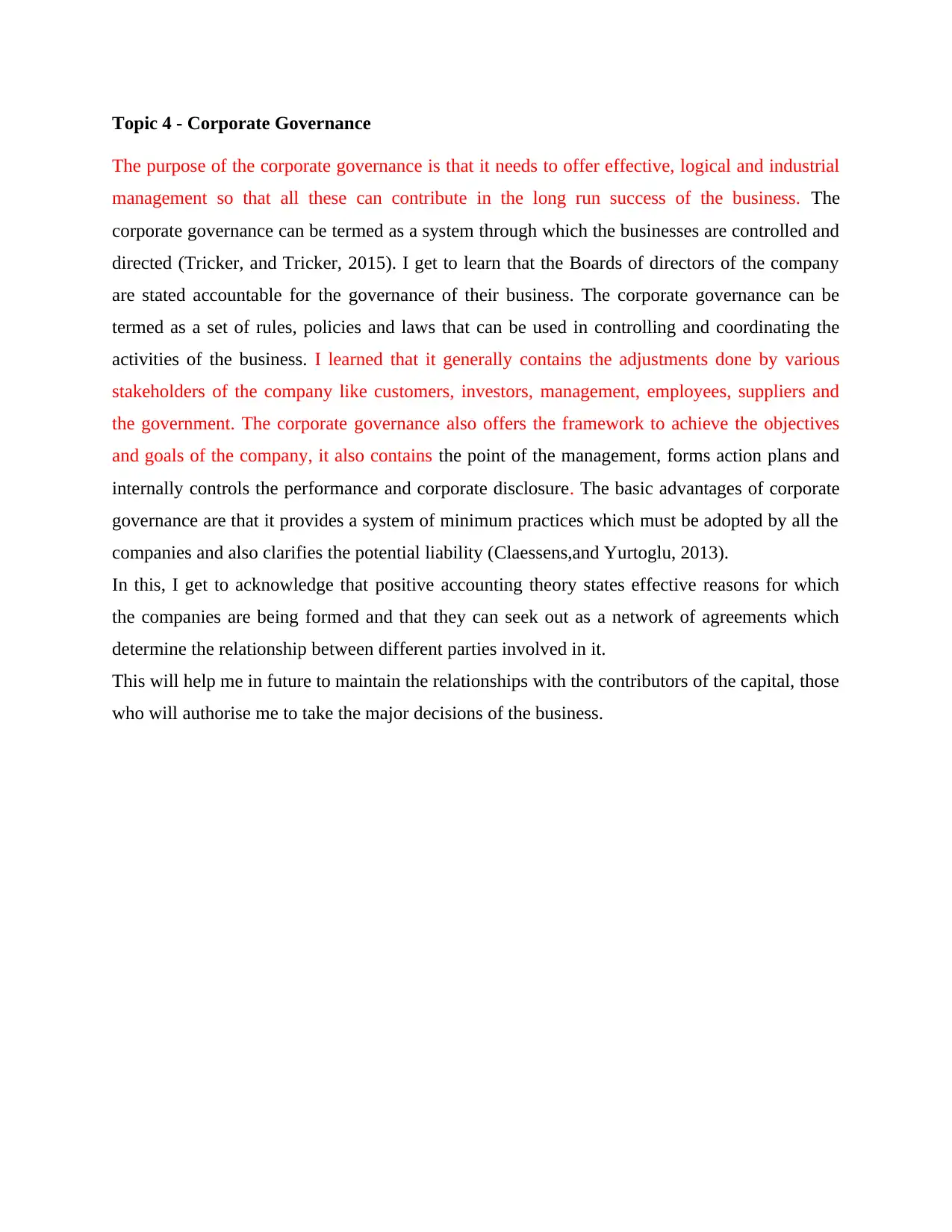
Topic 4 - Corporate Governance
The purpose of the corporate governance is that it needs to offer effective, logical and industrial
management so that all these can contribute in the long run success of the business. The
corporate governance can be termed as a system through which the businesses are controlled and
directed (Tricker, and Tricker, 2015). I get to learn that the Boards of directors of the company
are stated accountable for the governance of their business. The corporate governance can be
termed as a set of rules, policies and laws that can be used in controlling and coordinating the
activities of the business. I learned that it generally contains the adjustments done by various
stakeholders of the company like customers, investors, management, employees, suppliers and
the government. The corporate governance also offers the framework to achieve the objectives
and goals of the company, it also contains the point of the management, forms action plans and
internally controls the performance and corporate disclosure. The basic advantages of corporate
governance are that it provides a system of minimum practices which must be adopted by all the
companies and also clarifies the potential liability (Claessens,and Yurtoglu, 2013).
In this, I get to acknowledge that positive accounting theory states effective reasons for which
the companies are being formed and that they can seek out as a network of agreements which
determine the relationship between different parties involved in it.
This will help me in future to maintain the relationships with the contributors of the capital, those
who will authorise me to take the major decisions of the business.
The purpose of the corporate governance is that it needs to offer effective, logical and industrial
management so that all these can contribute in the long run success of the business. The
corporate governance can be termed as a system through which the businesses are controlled and
directed (Tricker, and Tricker, 2015). I get to learn that the Boards of directors of the company
are stated accountable for the governance of their business. The corporate governance can be
termed as a set of rules, policies and laws that can be used in controlling and coordinating the
activities of the business. I learned that it generally contains the adjustments done by various
stakeholders of the company like customers, investors, management, employees, suppliers and
the government. The corporate governance also offers the framework to achieve the objectives
and goals of the company, it also contains the point of the management, forms action plans and
internally controls the performance and corporate disclosure. The basic advantages of corporate
governance are that it provides a system of minimum practices which must be adopted by all the
companies and also clarifies the potential liability (Claessens,and Yurtoglu, 2013).
In this, I get to acknowledge that positive accounting theory states effective reasons for which
the companies are being formed and that they can seek out as a network of agreements which
determine the relationship between different parties involved in it.
This will help me in future to maintain the relationships with the contributors of the capital, those
who will authorise me to take the major decisions of the business.
Paraphrase This Document
Need a fresh take? Get an instant paraphrase of this document with our AI Paraphraser
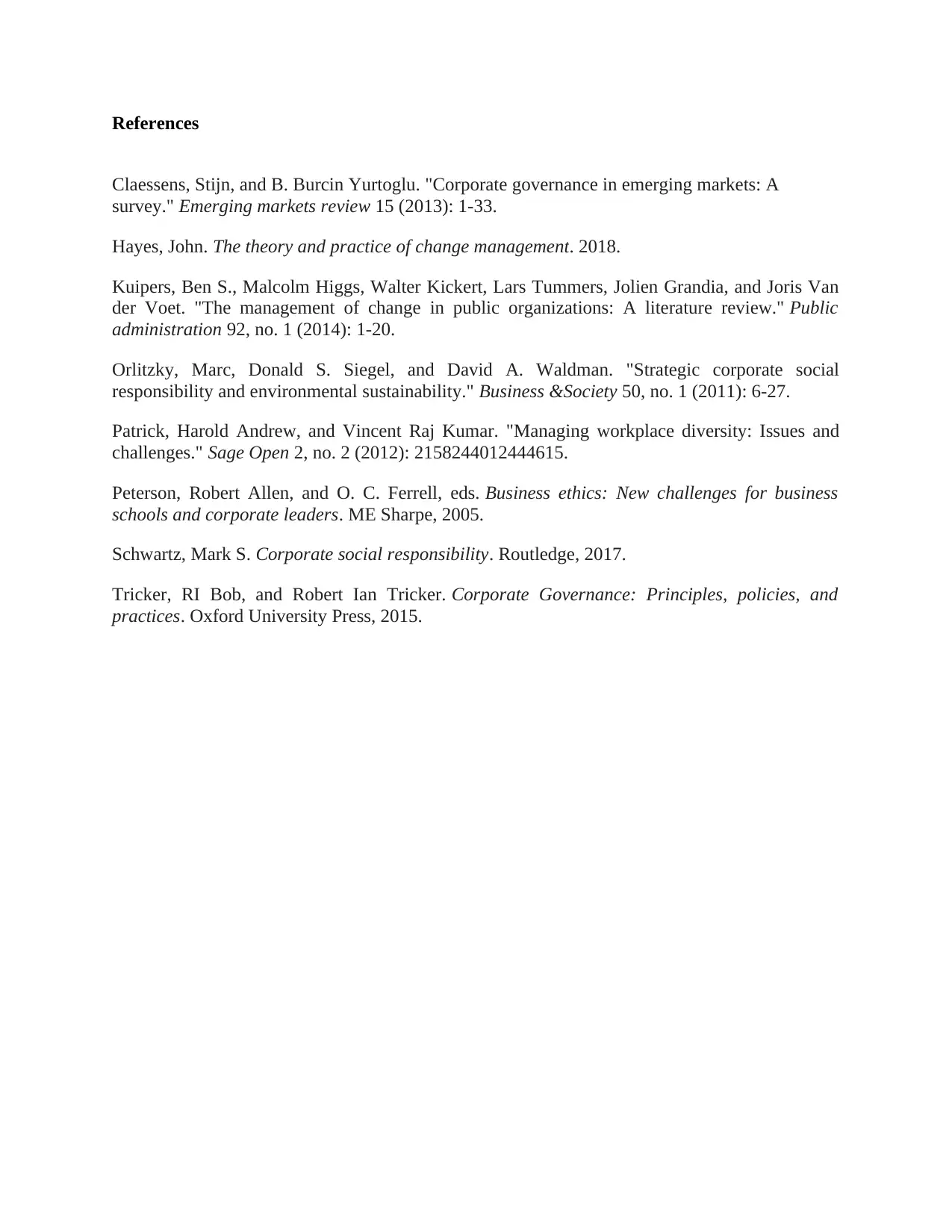
References
Claessens, Stijn, and B. Burcin Yurtoglu. "Corporate governance in emerging markets: A
survey." Emerging markets review 15 (2013): 1-33.
Hayes, John. The theory and practice of change management. 2018.
Kuipers, Ben S., Malcolm Higgs, Walter Kickert, Lars Tummers, Jolien Grandia, and Joris Van
der Voet. "The management of change in public organizations: A literature review." Public
administration 92, no. 1 (2014): 1-20.
Orlitzky, Marc, Donald S. Siegel, and David A. Waldman. "Strategic corporate social
responsibility and environmental sustainability." Business &Society 50, no. 1 (2011): 6-27.
Patrick, Harold Andrew, and Vincent Raj Kumar. "Managing workplace diversity: Issues and
challenges." Sage Open 2, no. 2 (2012): 2158244012444615.
Peterson, Robert Allen, and O. C. Ferrell, eds. Business ethics: New challenges for business
schools and corporate leaders. ME Sharpe, 2005.
Schwartz, Mark S. Corporate social responsibility. Routledge, 2017.
Tricker, RI Bob, and Robert Ian Tricker. Corporate Governance: Principles, policies, and
practices. Oxford University Press, 2015.
Claessens, Stijn, and B. Burcin Yurtoglu. "Corporate governance in emerging markets: A
survey." Emerging markets review 15 (2013): 1-33.
Hayes, John. The theory and practice of change management. 2018.
Kuipers, Ben S., Malcolm Higgs, Walter Kickert, Lars Tummers, Jolien Grandia, and Joris Van
der Voet. "The management of change in public organizations: A literature review." Public
administration 92, no. 1 (2014): 1-20.
Orlitzky, Marc, Donald S. Siegel, and David A. Waldman. "Strategic corporate social
responsibility and environmental sustainability." Business &Society 50, no. 1 (2011): 6-27.
Patrick, Harold Andrew, and Vincent Raj Kumar. "Managing workplace diversity: Issues and
challenges." Sage Open 2, no. 2 (2012): 2158244012444615.
Peterson, Robert Allen, and O. C. Ferrell, eds. Business ethics: New challenges for business
schools and corporate leaders. ME Sharpe, 2005.
Schwartz, Mark S. Corporate social responsibility. Routledge, 2017.
Tricker, RI Bob, and Robert Ian Tricker. Corporate Governance: Principles, policies, and
practices. Oxford University Press, 2015.
1 out of 5
Related Documents
Your All-in-One AI-Powered Toolkit for Academic Success.
+13062052269
info@desklib.com
Available 24*7 on WhatsApp / Email
![[object Object]](/_next/static/media/star-bottom.7253800d.svg)
Unlock your academic potential
Copyright © 2020–2026 A2Z Services. All Rights Reserved. Developed and managed by ZUCOL.




